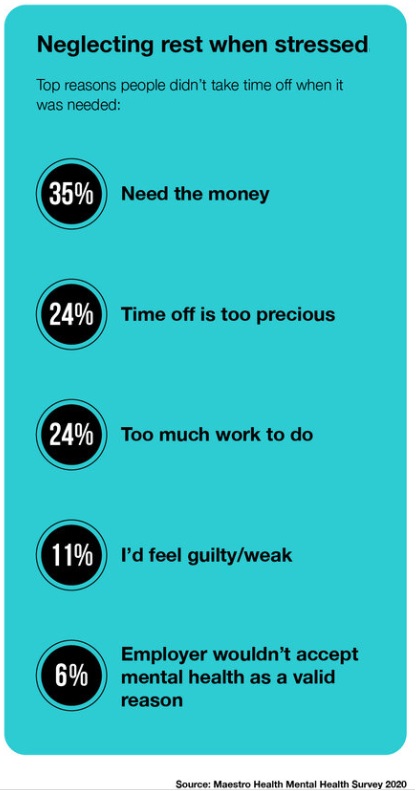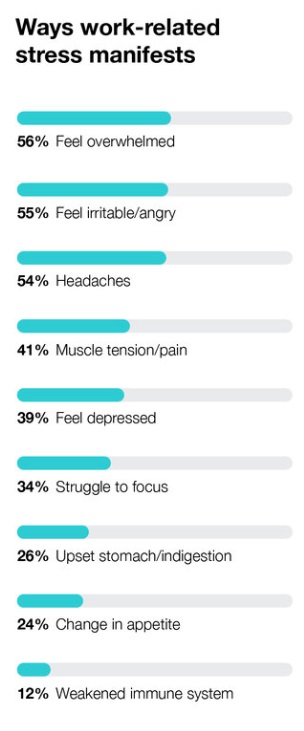 Thesurvey found 1 in 3 employees experienced workplace stress on adaily basis, with those in the media, health care and food servicesindustries having the most burnout. (Photo: Shutterstock)
Thesurvey found 1 in 3 employees experienced workplace stress on adaily basis, with those in the media, health care and food servicesindustries having the most burnout. (Photo: Shutterstock)
Although most employees are satisfied with their mental healthcoverage, they are afraid to bring up their problems to theiremployers.
|That's according to "Mental Health in the Workplace." asurvey released this month and conducted by Maestro Health, whichfound that 63% of employees struggled with a mental healthcondition, and 42% said it had a "significant impact" on theirability to do their jobs. Yet, according to the survey, 51% saidthey were not comfortable bringing it up with their managers.
|Related: Mental health stigma hurts employers andemployees
|"The spotlight that is now on mental health is long overdue, andit's up to employers, health care providers and health plans tomove the needle on mental well-being communication, education andsupport services available in and out of the workplace," said NancyReardon, chief strategy and product officer at MaestroHealth.

Maestro Health, a health and benefits third-party administrator,surveyed 2,009 American workers from March 20 through March 22. Thesurvey comes as the COVID-19 pandemic, which is "economicallydisruptive, socially isolating and fraught with emotion," hasserved as a "wakeup call" on mental health in the workplace,according to the survey.
|"It shouldn't take a crisis for company leaders to put mentalwell-being at the forefront, but now more than ever, employersshould be working to ensure their employees have what they need tobe well," said Craig Maloney, Maestro Health's chief executiveofficer.
|The survey found 1 in 3 employees experienced workplace stresson a daily basis, with those in the media, health care and foodservices industries having the most burnout. But it also revealedproblems in communications to employees about mental healthcoverage, given that 56% of respondents said they had not receivedsuch information from their employers.
|The survey also found the ages of managers mattered in thatcommunication. Of respondents whose managers were in their 20s and30s, 54% felt comfortable talking about their mental health, whileonly 43% felt the same if they had managers in their 50s orolder.
|Depression, anxiety and post-traumatic stress disorder were theconditions with the most stigma, according to the survey.
|That said, managers were not likely the first to hear aboutworkplace stress. While 66% of the respondents said a coworker hastalked to them about their mental health struggles, only 49% feltcomfortable discussing it with their managers, according to thesurvey.
|Companies with 50 to 249 employees had the best communication onthe subject, with 70% of respondents saying they felt comfortabletalking to their coworkers about their mental health struggles.
|Those in the real estate, insurance and legal industries had thehighest levels of discomfort. In the legal industry, where mentalhealth has been a recurring problem, 57% of respondents feltuncomfortable bringing it up, according to the survey. Only 38%said they had received information from their employers aboutmental health coverage.
|Read more:
- Progress in the fight against mental health stigma,but more work to be done
- Employees planning to use PTO for 'staycations,'mental health
- Can treating behavioral health cut medicalcosts?
Complete your profile to continue reading and get FREE access to BenefitsPRO, part of your ALM digital membership.
Your access to unlimited BenefitsPRO content isn’t changing.
Once you are an ALM digital member, you’ll receive:
- Critical BenefitsPRO information including cutting edge post-reform success strategies, access to educational webcasts and videos, resources from industry leaders, and informative Newsletters.
- Exclusive discounts on ALM, BenefitsPRO magazine and BenefitsPRO.com events
- Access to other award-winning ALM websites including ThinkAdvisor.com and Law.com
Already have an account? Sign In
© 2024 ALM Global, LLC, All Rights Reserved. Request academic re-use from www.copyright.com. All other uses, submit a request to [email protected]. For more information visit Asset & Logo Licensing.








